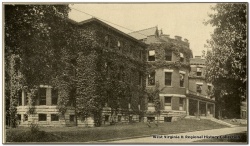Difference between revisions of "Huntington State Hospital"
M-Explorer (talk | contribs) |
M-Explorer (talk | contribs) |
||
| Line 3: | Line 3: | ||
| image = Huntingtonmale.jpg | | image = Huntingtonmale.jpg | ||
| image_size = 250px | | image_size = 250px | ||
| − | | alt = | + | | alt = |
| caption = | | caption = | ||
| established = | | established = | ||
Revision as of 15:42, 9 February 2010
| Huntington State Hospital | |
|---|---|
 | |
| Construction Began | 1897 |
| Current Status | Active |
| Building Style | Cottage Plan |
| Alternate Names | Huntington Hospital Mildred Mitchell-Bateman? Hospital |
History
Huntington Hospital was created by an act of the legislature in 1897, making it the second oldest hospital in the State of West Virginia. When established, it was called the Home for Incurables; this was later changed to the Huntington State Hospital. On October 2, 1999, the name of the hospital was again changed to the Mildred Mitchell-Bateman? Hospital.
In the 1950's, the hospital had a mixed population with a census of nearly 1,800; approximately one-third were developmentally disabled, and one-third were geriatric. The Hospital has gradually reduced its inpatient population; this reflects the national movement towards deinstitutionalization and community based pro- grams. This effort was greatly enhanced by the attention generated for mental health services through a class action suit resulting in the Hartley Consent Degree. In 1977, a complete reorganization of the hospital began with emphasis on specialization of direct care services. In 1978, an affiliation agreement was signed with the Marshall University School of Medicine - the first step toward developing Huntington Hospital's potential to become a teaching institution.
In 1988, this hospital became the first (state-operated) psychiatric hospital in West Virginia to be accredited by the Joint Commission on Accreditation of Healthcare Organizations.
In February 1990, the effort to reduce inpatient beds was completed with the closure of the units in Building 3 where long-term mentally ill patients were hospitalized. From this point, the hospital became a 90-bed facility.
In December 1990, initial certification for the hospital with the Health Care Financing Authority was granted.
The hospital has provided treatment, education and referral services for dually diagnosed mentally ill substance abuse patients (MICA) since January 1997.


